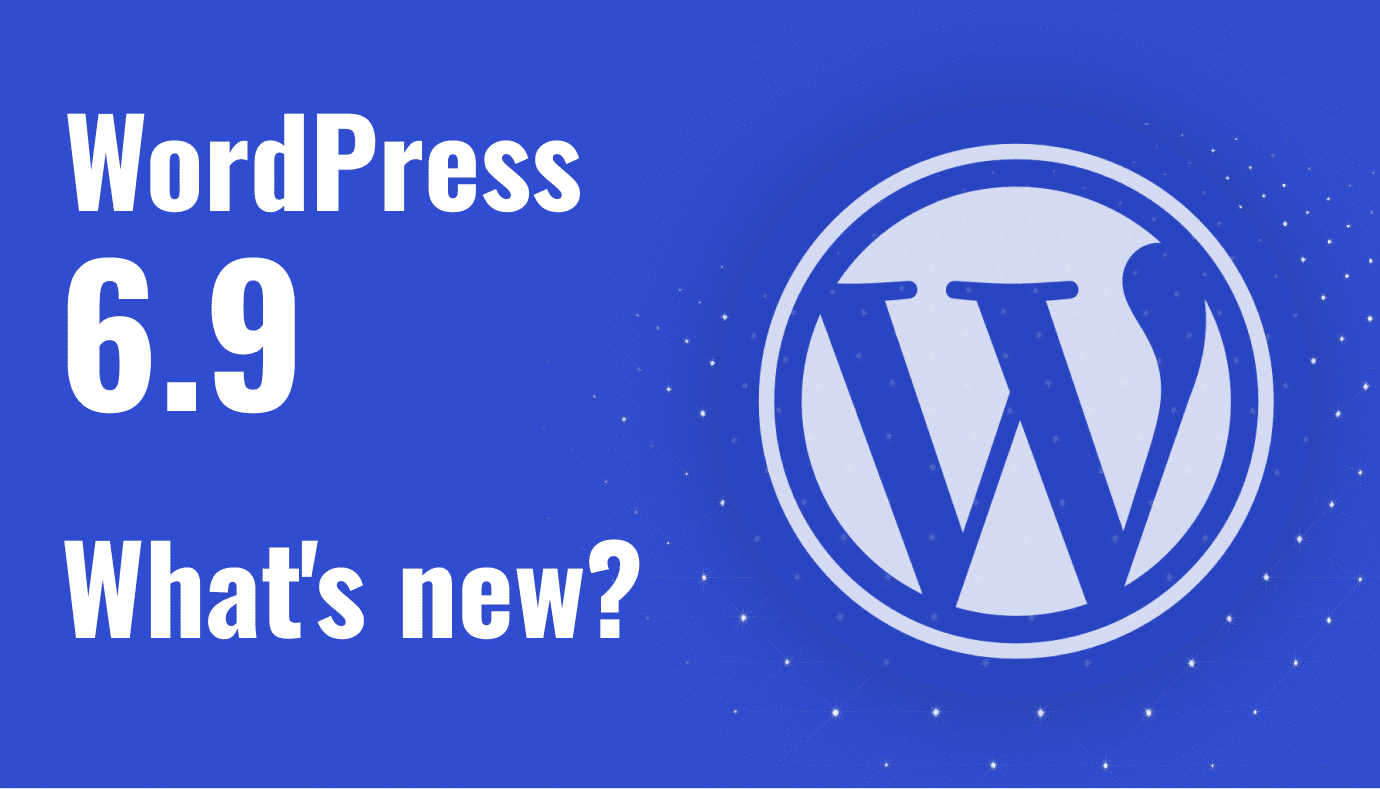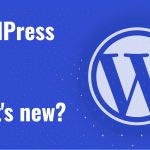WordPress 6.9: Complete Overview of All New Features and Improvements
WordPress 6.9 arrives on December 2, 2025, with a range of significant improvements. After a turbulent year when the release was first canceled and then restored due to community pressure, this version brings important updates in collaboration, performance, and preparation for WordPress’s AI future.
Key Features at a Glance
- Block-level comments for team collaboration
- Simplified editing mode without distractions
- Hide blocks without deleting them
- Command Palette across entire WordPress admin
- Abilities API for AI integration
- Performance improvements and faster navigation
Site Editor Improvements
Simplified Editing Mode
The Site Editor now offers a new simplified mode that’s ideal for content authors. If you don’t need design tools and want to focus only on text and images, this mode allows you to work without distractions.
You can switch between simplified and full mode at any time depending on what you need to edit. All advanced design tools remain available, they just don’t get in the way during routine content work.
Template Management Revolution
Template management has undergone a major improvement. WordPress 6.9 brings:
- Multiple templates per slug – you can have several versions and switch between them
- Template activation/deactivation – easy switching between theme and custom templates
- Template drafts – create a new template but publish it only when it’s ready
- Custom template preservation when switching themes
- REST API endpoints for programmatic template management
Template management is now much more intuitive and flexible than ever before. You can experiment without worrying about losing your work.
Block Hiding (Block Visibility)
A new feature allows you to hide blocks on the frontend while keeping them in the editor. This is ideal for:
- Staging content before publication
- A/B testing different versions
- Seasonal campaigns
- Preparing future content
- Alternative design versions
- Testing layouts
Non-destructive workflow means you’re not deleting anything – just temporarily hiding it. In the future, there will also be an option to hide blocks based on screen size.
Block-level Comments: Collaboration Like Google Docs
This is one of the most significant new features! WordPress 6.9 brings the ability to add comments directly to individual blocks. The feature is officially called Notes and works as follows:
- Click on the block you want to comment on
- In the block toolbar, click the three dots and select “Add note”
- Write your comment or feedback
- Other team members can reply and mark the note as resolved
You can see all notes in a clear sidebar, from where you can navigate directly to the block the note relates to.
Who Is This For?
| Team Type | Use Case |
|---|---|
| Editorial Teams | Editors can leave notes for authors before publication |
| Agencies | Clients can provide feedback directly in the editor |
| Developers | Team communication about implementing specific sections |
| Freelancers | Organizing personal notes and TODOs |
Performance and Speed
WordPress 6.9 brings a range of performance improvements that will noticeably speed up both admin work and frontend navigation.
Speculative Loading and Optimizations
- Instant page transitions – transitions between pages are nearly instantaneous
- Browser history support – fast transitions work even when using Back/Forward buttons
- Automatic minification and inlining of styles and scripts
- Smarter data fetching for faster admin interface
- bfcache-based navigation for logged-in users
Cache and Database Optimizations
Improved cache invalidation stores the “last changed” value directly in the cache key instead of using it as salt. This means better cache consistency and fewer unnecessary cache misses.
Two fixes also reduce unnecessary term recounting during taxonomy operations – if you work with large sites with many categories and tags, you’ll appreciate this improvement.
New Features for Developers
Command Palette Everywhere
The Command Palette (keyboard shortcut for quick actions) is now available throughout the entire WordPress admin, not just in the Site Editor. You can quickly navigate, open settings, or create content without clicking through endless menus.
If you’re used to command bars in applications like VS Code, Notion, or Slack, you’ll feel right at home.
Abilities API – A New Era for WordPress
Abilities API is a completely new API that provides a registry of callable functions with defined inputs, outputs, and descriptions. It’s designed to make WordPress functionality accessible to:
- AI systems
- Developers for automation
- External applications through a standardized interface
This is the foundation for future AI integration in WordPress. AI assistants will be able to “peek into” the Abilities registry and understand what features WordPress offers and how to call them.
Interactivity API – Major Improvements
The Interactivity API is getting a new navigation algorithm for client-side navigation that replaces not only HTML but also CSS and loads the necessary JavaScript. This enables:
// New capabilities in Interactivity API:
- Client-side comment form submissions
- "No results" blocks in instant search
- Post Content block within regions
- Conditional CSS/JS based on block attributesIf you’re building interactive blocks or modern JS-based features, you can now avoid older hacks and third-party libraries. Your code will be cleaner, future-proof, and fully aligned with WordPress core standards.
DataViews and DataForm – More Options
DataViews and DataForm components are getting significant improvements:
New Field Types
- media
- boolean
- array
New Filter Operators
- lessThan, greaterThan
- contains, notContains
- startsWith, between
- on, before, after
Block Bindings API – More Blocks
Block Bindings API, which connects blocks to dynamic data sources (custom fields, external APIs), is getting expanded support for more blocks, improved UI, and greater extensibility.
HTML API – Speed and Reliability
HTML API provides tools for reliable and efficient HTML handling in the WordPress environment. Version 6.9 brings:
- Significantly higher HTML processor speed
- Support for more edge cases
- Safe composable HTML templating
- Development of block attribute sourcing
AI Readiness (Canonical Plugins)
While WordPress 6.9 itself won’t include an AI chatbot or direct AI features, it creates the foundation for AI future. Three important components will be released as canonical plugins alongside version 6.9:
1. MCP Adapter
Model Context Protocol (MCP) is an open protocol that standardizes how applications provide context to LLMs (large language models). The MCP Adapter in WordPress implements this standard and:
- Exposes Abilities API for AI assistants
- Connects to other MCP servers
- Enables conversational WordPress site management
- Opens doors to automation and integration with AI systems
2. PHP AI Client SDK
PHP AI Client SDK offers a unified, provider-agnostic interface for AI integration into WordPress. Main advantages:
- Centralized credential management – admin sets up preferred AI service in one place
- Universal API – any AI-enabled plugin works without duplicate setup
- Ready-made framework – model selection, streaming, multimodal, error handling
- Modular design – core PHP package + WordPress-specific add-on
3. New WordPress Admin
A modular and extensible redesign of the WordPress admin is in early development. The emphasis is on:
- Flexibility and customization
- Separation of structure from presentation
- Reusability across admin interface
An experimental version will be available in the Gutenberg plugin, where contributors can opt-in and provide feedback.
What WordPress 6.9 WON’T Have
It’s important to know what you won’t find in this version:
- No new default theme – decision influenced by release pace and maturity of block themes
- Mega Menu block is not yet part of Core (maybe in a future version)
- Built-in AI chatbot – AI features will be available through canonical plugins
- Full-page client-side navigation – just the foundation for now, opt-in feature coming later
Important Dates
| Event | Date |
|---|---|
| Beta 1 | October 21, 2025 |
| Release Candidate 1 | End of November 2025 |
| Final Release | December 2, 2025 |
Conclusion
WordPress 6.9 is a solid update that focuses on three key areas:
- Collaboration – block-level comments bring team collaboration to a new level
- Performance – faster navigation, better cache management, and database optimizations
- AI readiness – foundation for future AI integration through Abilities API and canonical plugins
For developers, the most interesting updates are in the Interactivity API, HTML API, DataViews, and especially the new Abilities API, which opens doors to AI automation.
For regular users and content creators, the most visible features will be block-level comments, simplified editing mode, and the ability to hide blocks.
After a turbulent year when the release was first canceled and then restored, WordPress 6.9 is proof of the strength of the WordPress community and its ability to influence the project’s direction.



